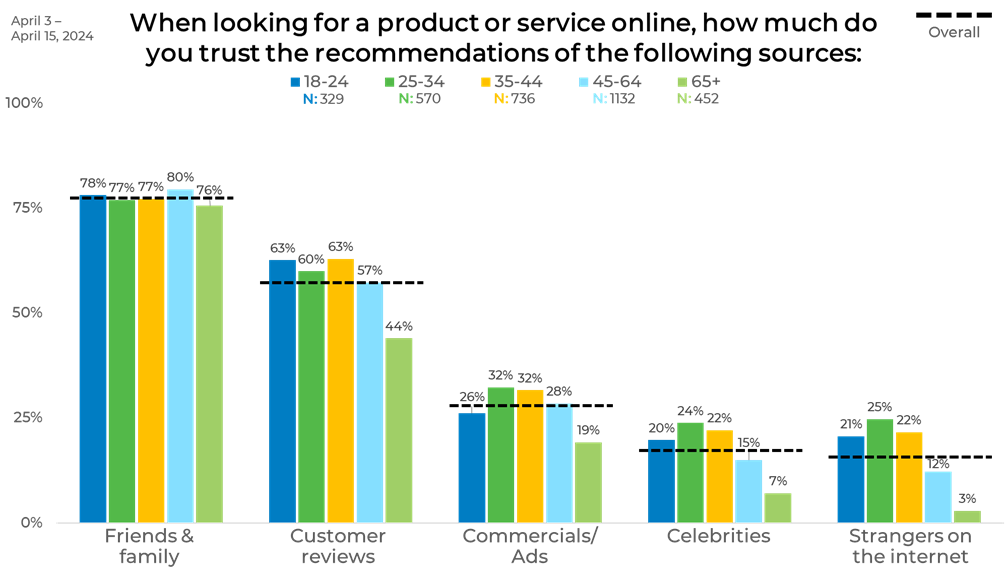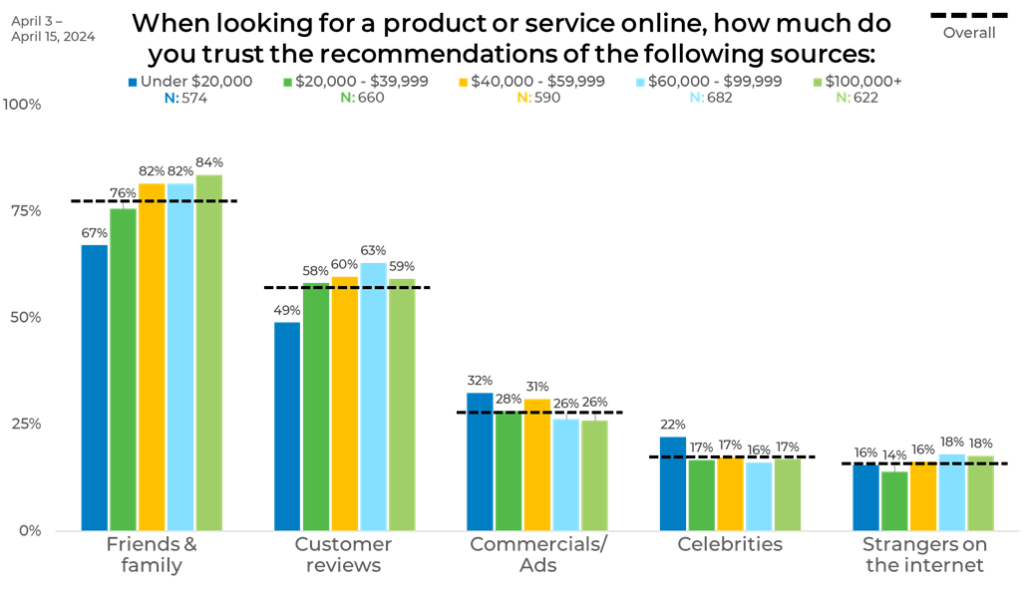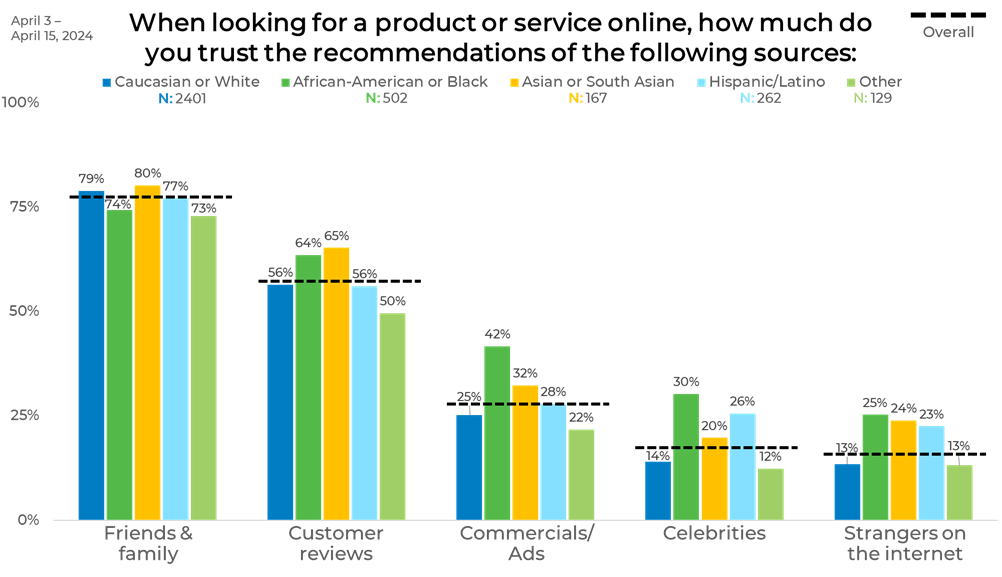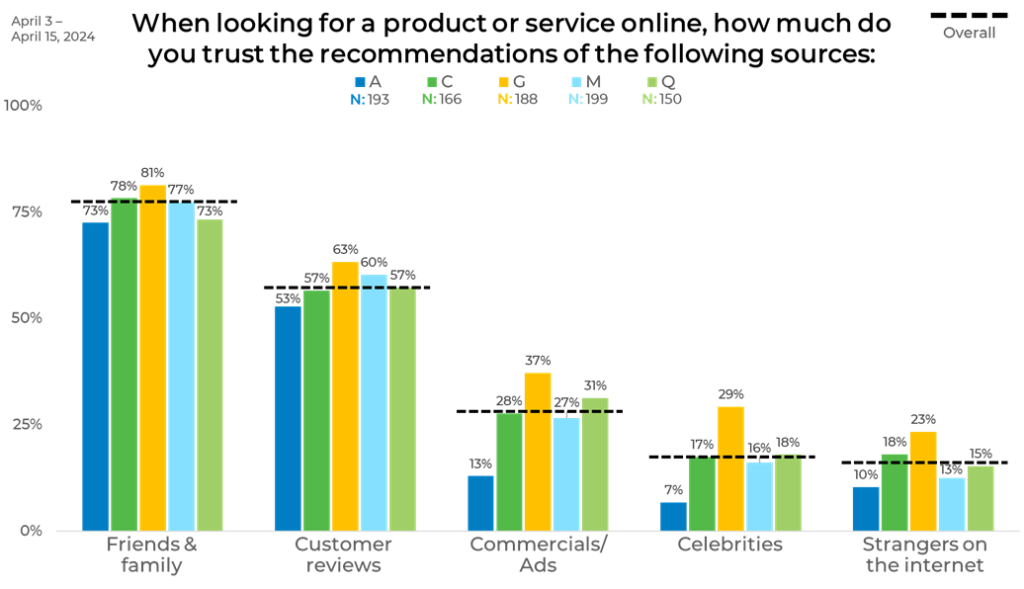
Is the Quality Pledge Just a Marketing Ploy?
June 28, 2024
MRX is Growing but at a Slower Rate
July 19, 2024When searching for a product or service online, the trust we place in various sources can vary significantly. While personal recommendations from friends and family top the list, commercials and celebrity endorsements struggle to earn our confidence, reflecting a clear preference for peer opinions over commercial influences.
General
According to the data, friends and family recommendations are the most trusted, with 78% of respondents expressing confidence in their advice. Customer reviews also hold considerable sway, trusted by 57% of people. In stark contrast, commercials and ads are trusted by only 28%, and celebrities fare even worse at 18%. Strangers on the internet are the least trusted source, with just 16% of respondents relying on their recommendations. This highlights a clear preference for personal and peer opinions over commercial and unfamiliar sources.

Gender
The trust in recommendations for products or services online reveals interesting gender differences. Both men and women trust friends and family the most, with 75% of men and 80% of women expressing this preference. Customer reviews are similarly trusted by both genders, with 56% of men and 59% of women finding them reliable. Men tend to trust commercials and ads more than women, at 31% compared to 26%. Celebrities are trusted by 21% of men but only 15% of women. Lastly, strangers on the internet are the least trusted, with a slight difference between men (17%) and women (15%).

Age
Age
Trust in online recommendations shows fascinating age-related trends. Friends and family are the most trusted source across all ages, with trust levels fairly consistent around 77-80%, peaking at 80% among those aged 45-64. Customer reviews are particularly influential among younger adults, with 18-24 and 35-44-year-olds both at 63%, and 25-34-year-olds at 60%. However, this trust declines significantly among the 45-64 age group (57%) and even more for those 65+ (44%).
Commercials and ads enjoy moderate trust among 25-44-year-olds (32%), slightly higher than the 18-24 age group (26%) and 45-64-year-olds (28%), but drop to 19% for those 65+. Celebrity endorsements resonate more with younger adults, particularly 25-34-year-olds (24%) and 35-44-year-olds (22%), compared to only 7% of the 65+ group. Strangers on the internet are the least trusted overall, yet 25-34-year-olds (25%) and 18-24-year-olds (21%) are more receptive to their opinions, with trust plummeting to just 3% among those 65+. These insights reveal that while personal connections are universally valued, younger generations are more inclined to trust online reviews and celebrity endorsements than their older counterparts.

Income
Trust in online recommendations varies across different income levels, highlighting notable trends. Friends and family are the most trusted source across all income groups, with trust increasing with income: 67% for the lowest income group, climbing to 84% for the highest. Customer reviews also show significant trust, particularly among middle to higher-income groups, peaking at 63% for the second highest income bracket and slightly dipping to 59% for the highest income group. Commercials and ads have a consistent but moderate level of trust, around 26-32% across all income levels. Trust in celebrity endorsements is generally low, ranging from 16% to 22%, with a slight decrease in trust among higher income groups. Strangers on the internet are the least trusted source across the board, with trust levels fairly consistent, ranging from 14% to 18%, slightly higher in the upper-middle income brackets.

Ethnicity
Trust in online recommendations shows significant differences across ethnicities. Friends and family are the most trusted source across all groups, with Asians or South Asians (80%) and Caucasians (79%) showing the highest trust, followed by Hispanics/Latinos (77%), African-Americans (74%), and those identifying as Other (73%). Customer reviews are particularly trusted by Asians or South Asians (65%) and African-Americans (64%), while both Caucasians and Hispanics/Latinos show 56% trust.
Commercials and ads have the highest trust among African-Americans. Strangers on the internet are the least trusted source, yet African-Americans (25%) and Asians or South Asians (24%) show higher trust compared to Hispanics/Latinos (23%) and Caucasians (13%).

Panels
Trust in online recommendations varies notably across different panels. Friends and family remain the most trusted source, with Panel C leading at 81%, followed by Panel G (78%), Panel M (77%), and Panels A and Q both at 73%. Customer reviews are particularly trusted by Panel C (63%) and Panel M (60%), while Panels G and Q show 57% trust, and Panel A trails slightly at 53%. Commercials and ads see the highest trust in Panel C (37%), followed by Panel Q (31%), Panel G (28%), Panel M (27%), and Panel A (13%). Celebrities wield the most influence in Panel C (29%) and to a lesser extent in Panel Q (18%) and Panel G (17%), with Panel M (16%) and Panel A (7%) showing the least trust. Strangers on the internet are the least trusted across all panels, though Panel C (23%) and Panel G (18%) are somewhat more trusting compared to Panel Q (15%), Panel M (13%), and Panel A (10%).

This is an excellent representation of where quality data sampling matters. Data At EMI, we prioritize strategically blending sample sources to balance demographics as well as behaviors and attitudes to ensure that we provide the most representative and accurate data.
Download The Sample Landscape: 2024 Edition to understand better how panels differ from one another and how they impact your data.




